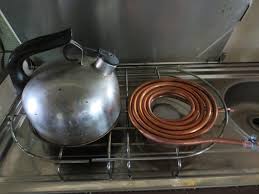Thinking about hot water for the Transit I’m converting. What are the pros and cons of using a tankless, or on-demand propane water heater vs a tank heater?
Would something like this work in a camper-van application?
Thinking about hot water for the Transit I’m converting. What are the pros and cons of using a tankless, or on-demand propane water heater vs a tank heater?
Would something like this work in a camper-van application?
Greetings!
Some people use them with varying amounts of success. Some people report they have water pressure problems with them, and others say they need to recirculate the water through them to get it hot enough.
Normally, I just heat water on my stove, but if I need a lot of hot water, I have a fire coil that I can use on my stove or in a campfire. It can heat 5-7 gallons in about 20 minutes.

Cheers!
Thanks. I’m curious about the coil. How does it work? Does it connect to a reservoir?
Greetings!
It can work in multiple ways. Most people I believe use two jugs, one higher than the other, and the hot water collects in the lower one.
I recirculate the water in a single jug. I have a bulb type siphon pump installed on the input line, to fill the hoses & coil with water to get it started. The pump also acts like a one way valve. Once started, as the water is heated it forces itself out of the coil toward the outlet side, which in turn sucks in water from the inlet side.
By recirculating the water, I can get it as hot as I like.
The commercial version uses an inline regulating valve (like a faucet) to adjust the speed in which the water flows through the coil which in turn adjusts the outlet water temperature that way. The slower the water flow, the hotter the water.
Cheers!
That’s very cool. Scoutmasters when I was a kid had a stove/boiler that married a tank to a stove in a pipe (just some grates to hold coals) with a copper line running from the bottom of the tank, coiling up inside the stovepipe, and back to the top of the tank. It’s supplied me with countless hours of interesting ways to apply that simple concept.
I use one of those in my trailer. They can make very hot water. Mine is vented outside. I would not use one without venting it.
I’ve seen solar hot water heaters that attach to vehicle roofs or roof racks. I’ve wondered about them. It seems like they would work best in warm sunny climates - precisely the weather in which you would prefer to put your vehicle in the shade. Nonetheless…
Tankless water heaters are more energy efficient and can provide continuous hot water, but they require a larger initial investment. Tank water heaters are less expensive and require less space, but they take longer to heat up. Both types of water heaters have their advantages and disadvantages.
I’ve had a good experience with the Camplux 5L 1.32 GPM RV water heater in my camper van. Tankless heaters provide hot water on demand, saving space and energy. However, they can be pricier and may have limitations in extreme weather conditions. For a camper van, a tankless propane heater could be a convenient option, offering hot water without the need for a bulky tank.